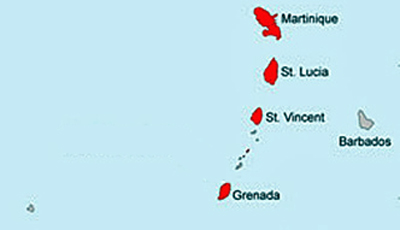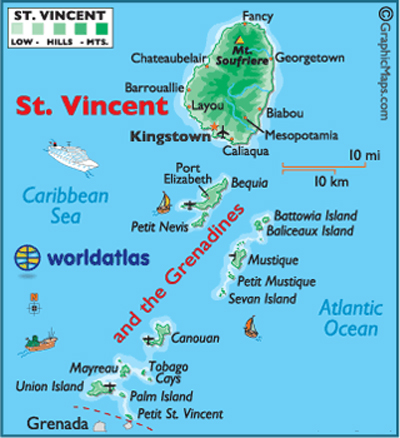Destinations & Sample Itineraries
St Lucia to The Grenadines
7-Day Cruise by s/y Aurora

A cruise around St Vincent and the Grenadines offers a number of intriguing start and finish options. We can connect from a regional international gateway airport such as Barbados or Grenada to one of the provincial airstrips at St. Vincent, Bequia, Union or Canouan. Or we can crank up the Wow factor for scenery and sailing (and deliver an unforgettable experience) by starting your trip in St. Lucia, which has an international airport. Some guests opt to start their cruise by flying into St. Vincent and boarding at Young Island Cut on the southern coast of St. Vincent or at Bequia. The trip described below takes advantage of the St. Lucia start.

Day 1: St Lucia
After landing at Hewanorra Airport on the southern end of St Lucia, the drive to the main yachting centre of Rodney Bay on the northwest corner of the island is a 2.5 hour journey through some of the lushest rainforest in the Caribbean. The road meanders between breathtaking (and sometimes nail biting) views down mountainous valleys and spectacular vistas of raw Atlantic coastline. Banana plantations straddle the road dotted with charismatic multi-colored shacks – a photographer's dream.
The logistics of a St Lucia start often mean arriving the day before your charter begins and spending a night ashore on St Lucia. Refreshed from your journey, we board the fully stocked Aurora at midday the next day. Anchored out in the bay, we enjoy a light lunch on the sparkling deck before heading south to our first night time spot – St Lucia’s famous Pitons, two volcanic plugs that rise vertically up out of the sea like the backs of sleeping beasts.
The snorkeling in this marine conservation area is outstanding. Swim as long as you like with these gorgeous sea creatures and then relax on the aft deck with hors d'oeuvres and a cocktail – and the majestic Pitons towering over you.
Day 2: St Lucia to Bequia
Day 2 starts early for our 50-mile sail to Bequia. We aim to leave by 8am to get the most out of this long day - one of the reasons for starting in St Lucia. Our anchorage under The Pitons is right at the southern end of St Lucia, but it takes about a half hour to get out of the shadow of the island, where gradually the easterly trade winds, which have been blowing steadily for three thousand miles all the way from Africa, fill in unhindered by land mass. An hour after departing, with a steady 18-20 knots on the beam, we're making 8 or 9 knots and carving through 6-8 foot long-period swells. An hour later, you look behind you to find that St Lucia has disappeared – with nothing but wind-driven seas ahead of you. You are now, for all intents and purposes, in the open, raw Atlantic ocean – exactly how it was for the early explorers. Not one thing has changed since Magellan and Columbus sailed here in search of the new world. The same wind. The same ocean swells. The same sense of isolation. With just a hint of imagination, land could be 1,000 miles away. You don’t get this in the BVIs!
St Vincent's Soufriere Volcano reaches over 3,000 feet, and is usually shrouded in thick heavy cloud. Gradually, the huge bulk of the land emerges from the haze as we close with the island. The next hour is about to turn into one of the most exhilarating sailing experiences you’ll ever have.
As we approach the northern end of St Vincent, both wind and seas are refracted around the top of the island. This means that as we get closer, the wind starts to shift aft of the beam, as do the swells. They also both increase. The 18-20 knot winds and 6-8 foot seas we had on the beam on the way across from St. Lucia build to 20-25 knots and 10 foot+, coming on our aft quarter. Now we begin hitting 11 knots.
A big swell picks us up and we start to surf down the face. The whole boat hums as this feral power locks us in its grip. Senses are overwhelmed with the sound of rushing wind and foaming seas while a cloud-capped volcano stands guard. Watch the speed... 12, 13 maybe 14, or even 15 knots. The decks remain dry and the finely tuned Aurora stays stable as she surges forward – propelled by enough natural energy to light a city.
The swell passes us by, we drop back to 10 knots, and you ease your grip while waiting for the next one. This is when you're thankful to be aboard the solidly-built Aurora. She shows her stellar pedigree in green water. Are you brave enough to go forward and sit on the bow seat? Our E-ticket ride – more thrilling than anything in Disneyland.
Soufriere's dramatic vertical rise out of the sea means that you can literally sail down the coast close enough to touch it. The permanent cloud cover blanketing the peaks at this northern end of St. Vincent ensure a plentiful supply of rain, producing thick and verdant vegetation. Triple canopy jungle runs rampant and it seems every single square inch of land sustains multiple layers of growth. The further we sail into the lee of the volcano, the more the wind and seas abate until they finally disappear altogether, although we continue to get hit by sporadic "bullets" of wind funneled down the valleys and peaks.
Being so close to land gives you an extraordinary view of this spectacular mountainous terrain, and an interesting example of the tenacity of Man. All over this impenetrable mountainside, land has been cleared so that the rich volcanic soil and perfect growing conditions can be farmed. Perched precariously on ridges and hanging on impossibly steep slopes are shacks and shelters for each small holding. The terrain is so radical that no machinery could possibly be used to farm this land. There seems no viable way of getting any produce out other than by foot or donkey. The implications of cultivating such inhospitable soil begs the unanswered question: "Who would...?" Then a tropical downpour sweeps through and bathes the jungle in a rainbow.
We are now in flat water for a couple of hours as we run down the west coast. This coincides perfectly with lunch, which we have on the move. We pass Wallilabou, the location for Port Royal in "Pirates of the Caribbean." If you have an interest, we can enter the bay and see what you recognize.
We come off the southern end of St. Vincent and, just like St. Lucia, the wind fills in and we switch off the engine for another blast of a beam reach sail for the final 10 miles across the channel to the island of Bequia (pronounced Bekway). We round Point Peter and the bustling little provincial town of Port Elizabeth opens up. But nobody ever calls it that, everyone just knows this as Bequia. We drop anchor off picturesque Princess Margaret Beach, and Whistlin' Willy stops by in his homemade canoe to show you his hand carved jewelry. You have officially arrived in the Grenadines.
Day 3: Bequia, Petit Nevis, Mustique
As we leave Bequia (how do you pronounce it?) we pass real close to Moonhole, an alternative community conceived in the sixties (and when you see it you will grasp the sixties ideology). Almost butting heads with this eco settlement is our lunchtime stop, the former whale rendering island of Petit Nevis. There is some great snorkeling here, as well as a little history in the abandoned infrastructure where the last whale was hauled ashore not so long ago. After lunch, it is just a brisk one-hour sail across to Mustique, the Beverly Hills of the Caribbean – where you have a very good chance of bumping into Mick Jagger or Hugh Grant should you venture into Basil's Bar. (Princess Margaret tends not to appear so much these days.)
Day 4: Mustique to Tobago Cays
We begin the day on a fast beam reach for the 18 mile run down to the Tobago Cays, passing the windward side of Canouan where Donald Trump's hair gets all mussed up as he stands outside his casino perched high on the headland. Take the helm – and feel the eager Aurora surge responsively beneath your hands.
The Tobago Cays are a group of small uninhabited islands with pure white beaches and translucent blue water, all protected by a horseshoe-shaped fringing reef - rightly called the "Jewels of the Grenadines." Now a marine conservation area, one of the "must do" snorkeling expeditions is go see the turtles gliding majestically through the seagrass, where they may be as interested in looking at you as you are in seeing them.
Day 5: Tobago Cays, Saltwhistle Bay, Petit St Vincent
Day 5 takes us to the white sand and crescent-shaped beach of Saltwhistle Bay for lunch. We choose the smart time to be in the very popular Saltwhistle – lunchtime when everyone going has gone and everyone coming has yet to arrive. Before the hoards descend, we make our departure for Petit St. Vincent, the most southerly of the Grenadines, where after sailing through a gap in the reef by the tiny sand atoll of Mopion, we spend the night.
Day 6: Petit St Vincent, Mopion, Union Island
Day 6 begins with a scene from "Castaway". We start early enough so you can get Mopion to yourself for a little while. We promise to come and rescue you for a smooth downwind sail to Sandy Island, which from the windward side looks very uninviting but reveals her beauty as we round the fringing reef. More great snorkeling here.
After lunch it is a close reach across to the western side of Union Island and Chatham Bay, where an evening lobster BBQ on the beach is a unique experience.
Day 7: Farewell
After breakfast on your last day, depending on which airport you have chosen to fly out from, we may get in one last snorkel before weighing anchor for your final sail through the crystal clear waters of the now familiar islands that make up St Vincent and the Grenadines.
Saying farewell to our sailing friends and the pampered luxury of the Aurora is never easy – for both guests and crew. But you'll leave with spectacular photos, happy memories and the knowledge that the Aurora awaits your next high seas adventure.
Remember, there are many variations to this sample itinerary. Your charter will be customized to fulfill the dreams of your charter party. That's the beauty of a crewed charter yacht sailing vacation.
HOME > Destinations & Sample Itineraries > St Lucia to The Grenadines

